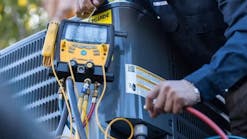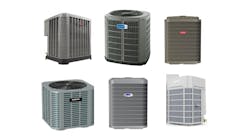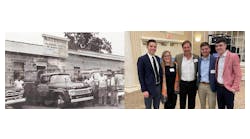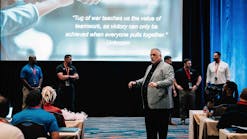Although the HVAC industry is traditionally a male-dominated field, there are a growing number of women in leadership positions who are making a real impact on this industry.
In fact, we at Contracting Business thought it was time that these women get the recognition they deserve. Therefore, we asked our readership to nominate candidates for our first HVACR Woman of the Year program.
Nominees had to either own a contracting firm, or hold an upper management position, and be a leader in the HVAC community. We also looked at years in the industry, positions held, technical expertise, association involvement, and the commitment to promote and improve the HVAC industry.
During the interviewing and judging process, we were overwhelmingly impressed by the credentials and achievement of nominations we received.
However, one nominee surfaced whose technical savvy, business acumen, and tireless commitment to the HVAC industry made her a natural choice. Therefore, we’re pleased to announce our first annual HVACR Woman of the Year: Bonetta Day of Dayco Heating & Air in Kennewick, WA.
An Illustrious Career
“I love everything about the HVAC business. It’s always a challenge, and there’s something new to learn every day,” says Bonetta Day.
Nevertheless, Day hadn’t originally planned a career in HVAC, despite a family background in construction.
While she majored in business in college, her husband Terry studied HVAC. After completing his education, her husband was anxious to open his own shop.
In 1976, the two opened up their first HVAC business, which was devoted to new construction. Bonetta and her sister Trish were the equipment installers. “It didn’t matter that we weren’t trained as installers; we learned on the job,” says Day.
“As you can imagine, there were very few women in the construction business at that time.” She describes how men in trades were often surprised, let alone shocked to encounter them on the job.
“Once, my sister and I were doing an install in a crawl space as carpenters were working above. As they assumed there were men up there, you could have knocked them over with a feather when we came out of the crawler,” she says.
Despite shocked looks and the occasional sexist remark, Day was never deterred from learning as possible much as possible about both the technical and financial aspects of the industry.
After 212 years of performing installs, Day moved into a lead position on jobs and started working to expand their business.
However, in 1980, Washington Public Power shut down three nuclear power plants in construction., which lay a huge blow to the local economy.
“The utilities were the major employer in town. Therefore, when plant construction shut down, 12,000 people were laid off in a month,” Day says.
The layoffs also impacted Day’s business. “With our business being 100% residential new construction, we were hit so hard by the layoffs. We then entertained closing shop,” she adds.
Instead of folding the company, they transferred it to one of Day’s service technicians was interested in taking over their business. “We paid our bills and transferred the company to our technician with his promise that he would honor all of our warranties and take great care of our customers,” says Day.
After closing their business, the Days headed to San Francisco where she continued her business education and her husband worked in iron reinforcement work or earthquake proofing for the city. After a few years, however, Day longed to return to construction.
By 1983, she returned to Washington where she worked for large industrial construction firms in construction management and contract administration.
“Working for these firms was a great education. I went from overseeing HVAC installations in homes to being involved in projects such as the construction phase of Basalt waste isolation, which is nuclear storage,” she says.
With these larger projects, Day gained experience in working with subcontractors, project management, estimating, controlling cost overruns, establishing and running a safety program, and what details to look for in contracts. All necessary experience to be a great HVAC contractor.
The Rebirth of a Company
In 1985, Day’s husband decided to start another HVAC business and he wanted her to run it.
“At first, I thought Terry was crazy to start a company again, especially because the region was still economically depressed,” she says.
As it turns out, the technician who had taken over their company was no longer interested in being an owner and wanted to return it to the Days. Shortly after Dayco Heating & Air was back in business.”
“Despite the five years that had passed and the down market, we were busy as soon as our builder and homeowner customers heard we were back in business,” Day says. “Also, several original employees wanted to return. Our reputation as a solid company with great customer service was intact.”
Although the new business was going well, Day was a bit reluctant to leave her construction management position.
“I told Terry I would return under certain terms: one, I no longer had to do installs and two, this company wasn’t going to just be a small ‘mom and pop’ operation. We were going to be a success,” she says.
In 1986, Day returned to the business as president, with her husband vice president of operations. She immediately focused on expanding Dayco’s customer base and developing a service department.
Since then, the residential/light commercial company has grown to nearly $5 million, with 35 employees. In addition to the Kennewick office, there’s a satellite office in Richland, and another planned in the near future.
“Currently, our business is 45% retrofit, 15% service, with the rest in new construction and fireplace installation,” Day says. “However, we know that new construction is finite in this region. For that reason, we’re placing an even greater emphasis on our service department and maintenance agreement base.”
A Positive Approach
Dayco’s successful rebirth hasn’t gone unnoticed by the HVAC industry. In 2002, the company was named Western Region Contractor of the Year by Excellence Alliance. Dayco was also the 2001 Soar Award winner for the Trane Northwest Region, and won Trane’s Pacesetter Award in 2002.
When asked what’s behind the success of Dayco, Day stresses that it’s essential to treat your customers, both external and internal equally well.
“We strive to provide an environment where employees can achieve great things, both personally and professionally. Furthermore, there’s nothing we would ask them to do that we wouldn’t — or haven’t — done ourselves,” she says. In fact, Day attends every service and equipment class with her technicians and managers.
In addition, all managers have been promoted from within. “Employees can identify a position or area they’re interested in and we’ll show them what they need to get there,” Day says.
For example, extensive in-house training is available for all staff, and non-technical personnel are encouraged to take technical courses for cross-training. In addition, Day wants to see all of her technicians NATE¯certified and hopes for the company become a testing and certifying location.
Day’s efforts are clearly working as many of her original employees are still with the company. According to Michele Peiffer, a bookkeeper with Dayco who nominated Day as Woman of the Year, “ Bonetta goes above and beyond to make customers happy and to make us look like the best company.”
Bret Watts, service manager, adds, “Bonetta is one of the most knowledgeable people I’ve met in this business. Furthermore, she makes us feel like family members, not just employees.”
Lorenzo Michell, a service technician, agrees. “This is a great working environment; you have the opportunity to learn something new every day,” he says. “Bonetta is a good person who’s open-minded and willing to listen. We consider her our boss and our friend.”
Giving Back
In addition to working hard to make Dayco successful, Day also spends a great deal of time working to promote the HVAC industry.
For example, she’s actively involved in the Homebuilder’s Association, Women in Construction, Refrigeration Service Engineers Society, Excellence Alliance Inc., and in her local chamber of commerce.
In addition, she helped spearhead a task force of area businesses to establish a two-year residential sheetmetal class. The program was so successful that she has been asked to help develop other vocational programs outside the HVAC field.
Finally, Day visits local schools and has been involved with Columbia Industries, an organization that rehabilitates, trains, and hires people with barriers to employment. Here, Bonetta speaks regularly with students, particularly women, on the benefits of working in the HVAC industry. Although the response has been positive, she says, there’s a long way to go.
“As an industry, we need to target the ‘other’ half of the population as women are a hugely untapped resource,” she says “Therefore, we have to encourage girls from a young age to consider the trades and show them what a bright future they can have.”
And for many young women and men, Bonetta Day might just be sufficient inspiration.








